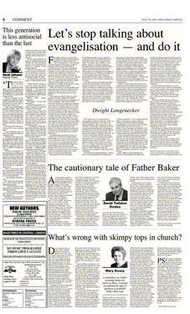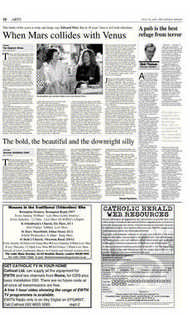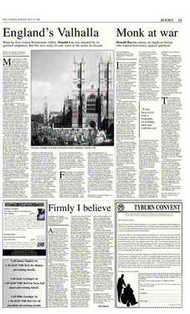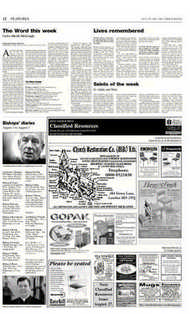Page 5, 30th July 2004
Page 5

Report an error
Noticed an error on this page?If you've noticed an error in this article please click here to report it.
Tags
Share
Related articles
Appointment Of Opus Dei Bishop Unsettles Liberals
Bishops Monitored Over Opus Dei Status
Opus Dei Under Fire For Attack On Disabled
Opus Dei Says Its Activities Open To All
Archbishop Closes Austria’s Seminary Of Shame
Vatican investigates scandal-hit seminary
An Opus Dei bishop is sent to investigate claims of child pornography and gay sexual activity at an Austrian seminary, writes Freddy Gray THE VATICAN has despatched an Opus Dei bishop to investigate allegations of commonplace homosexual activity and pornography in a seminary in Austria.
The Pope has sent Bishop Klaus Küng to Vienna just 10 days after reports that a wealth of pornographic material, including images of child sex abuse, was discovered in the seminary of St Pölten, west of the city.
Bishop Küng will conduct an investigation into the remarkable allegations made against the seminarians and priests of St Pölten. He will also assess the way Bishop Kurt Krenn of St Pölten diocese, does his job and report his findings back to the Vatican.
Bishop Küng is unlikely to treat any homosexual matter lightly. He is well-known for holding strongly conservative views, particularly with regard to homosexual priests.
He has said in the past that men who are homosexually inclined but not sexually active should only “very rarely” be ordained and then only after “a long examination”.
Commentators on the Church in Austria believe that he was appointed Bishop of Feldkirch as an antidote to the liberalism of Cardinal Franz Konig, the former spiritual leader of the Catholic Church in Austria.
The move to use an Opus Dei bishop to investigate such a scandal is further evidence that the Vatican is increasingly relying on the radically orthodox personal prelature to police the Church.
A day before the Vatican announced the appointment of their own investigator, Austrian police detectives had charged a 27-year-old seminarian for the possession and distribution of child pornography.
The police investigation is not concerned with any possible homosexuality in the seminary because it would not be a crime.
The Austrian news magazine Profil published a report of sexual depravity in the St Pölten seminary, with photographs of seminarians indulging in homosexual acts.
Some 40,000 pornographic images were apparently stored on the hard drives of seminary computers.
Bishop Krenn has been under heavy criticism since he dismissed the photographed antics of St Pölten’s seminarians as “childish pranks having nothing to do with homosexuality”. He insisted that the affair has been blown out of proportion. “What has been found is a student who has done something,” he said.
“Although these things naturally fall into my competence, I had nothing to do with them.” Two directors of the St Pölten seminary, Fr Ulrich Kuechl and Fr Wolfgang Rothe, have already stepped down while still protesting their innocence, and many Catholics throughout Austria are clamouring for Bishop Krenn to do the same.
But as The Catholic Herald went to press he was still clinging on to his job.
Michael Dinhobl, a spokesman for St Pölten diocese, claimed that Bishop Krenn was simply protecting his seminary leaders from persecution by the press.
Mr Dinhobl said that the photographs were not conclusive evidence, and should not be used to destroy the reputations of the people pictured in them. He added that it was Bishop Krenn who brought the matter of child pornography to the attention of the police.
The arrival of Bishop Küng means that Bishop’s Krenn’s own investigation into the allegations will be suspended, and all impor tant diocesan decisions must now be referred to the papal envoy.
Apparently it was Bishop Krenn’s own investigative committee that called for a direct intervention from the Vatican.
Cardinal Christoph Schönborn, president of the bishops conference of Austria, came back early from his holiday in France to attend to the crisis in his Church. “It is very clear — and the Austrian bishops said this very clearly — that there is no room for pornography or a homosexual network in a Roman Catholic seminary,” he said.
Wolgang Schuessel, the Austrian Chancellor, said that because of the separation between Church and state in Austria, he had no right to interfere directly as a politician. “But as a believer and a Catholic,” he added, “I want a quick and frank explanation.
“The question is, does the Church have a duty to live in an exemplary fashion according to certain principles? And the clear and simple answer is ‘yes’. Those who are involved know exactly what to do.” Government offices in Austria have been overwhelmed with calls from angry Austrian citizens who wish to stop paying the compulsory Church tax.
Austrians, the majority of whom are Catholic, can refuse to pay the tax if they apply in writing to their local council, but their names are then deleted from Church registers, and they are not entitled to receive the sacraments.
The last major scandal to rock the Austrian Church was in 1995. Cardinal Hans Hermann Groer, then head of the Church in Austria, was accused of sexually molesting young boys. Although Cardinal Groer was never actually charged for the alleged offences, the Vatican replaced him and he retired to a monastery.
blog comments powered by Disqus















